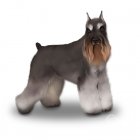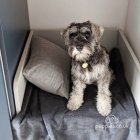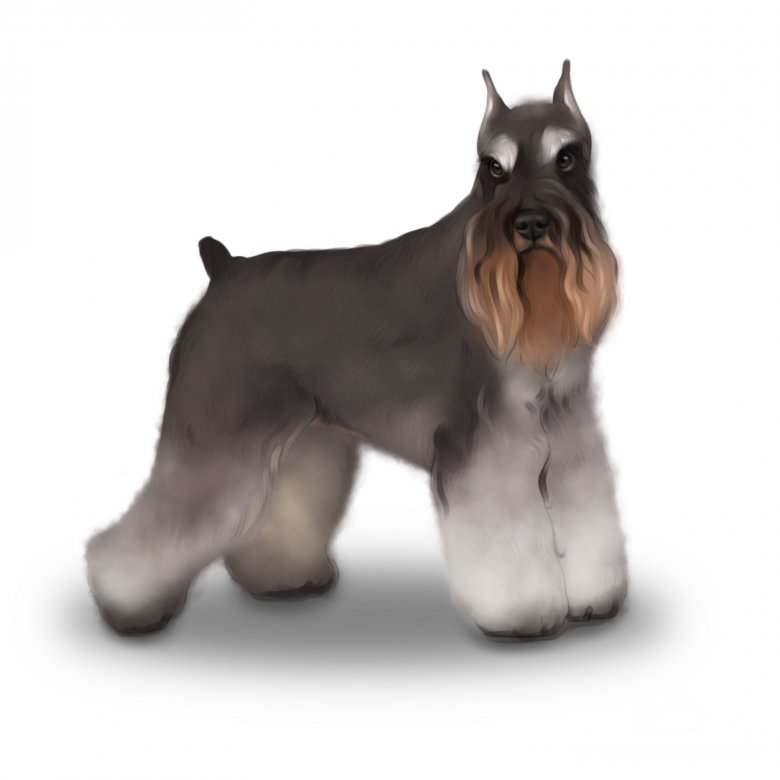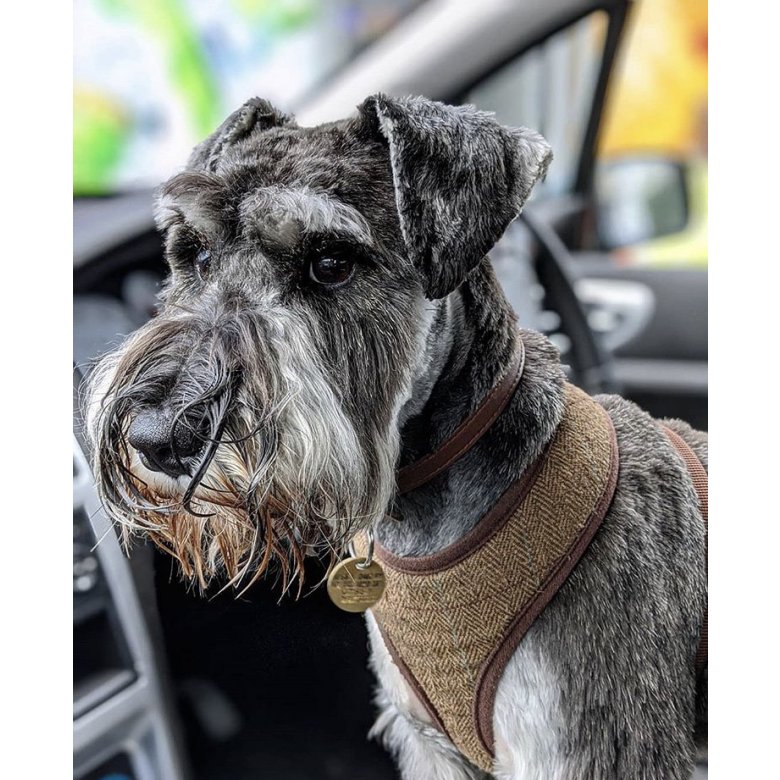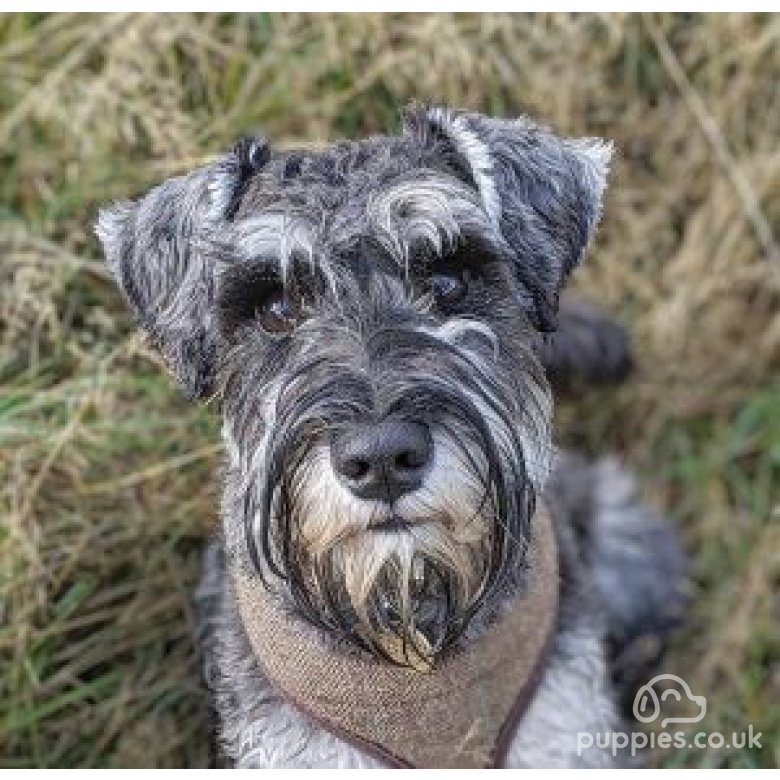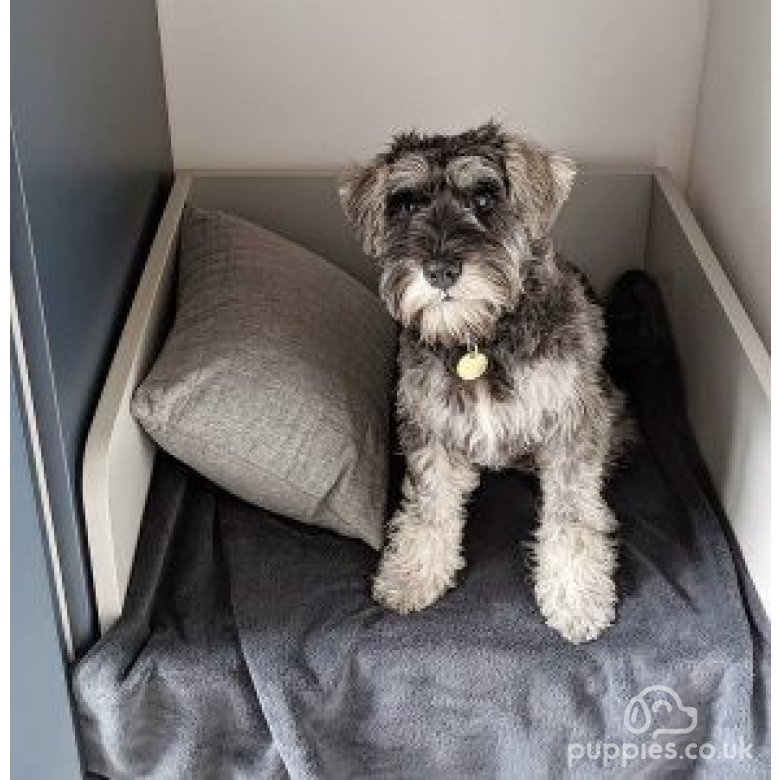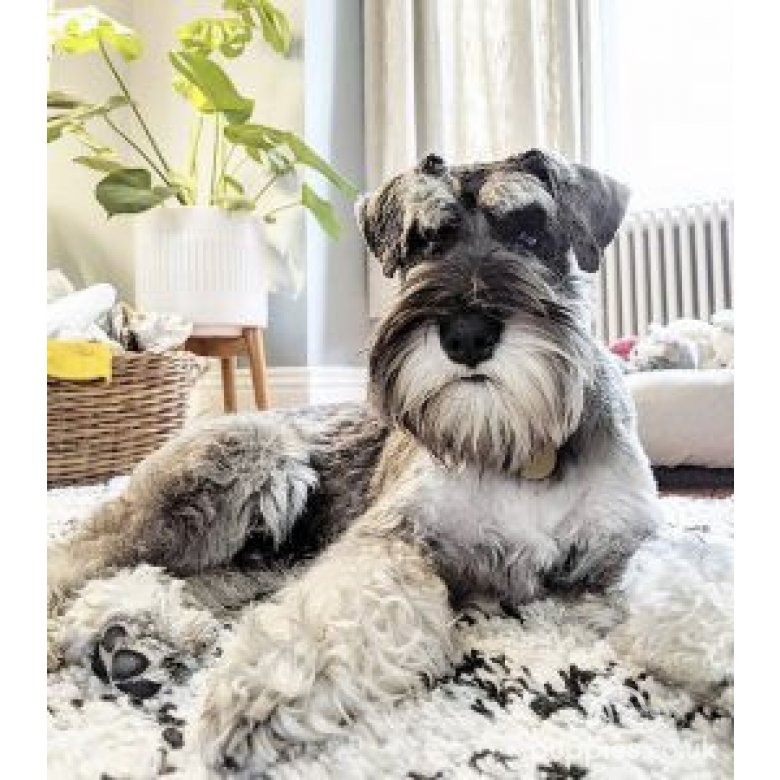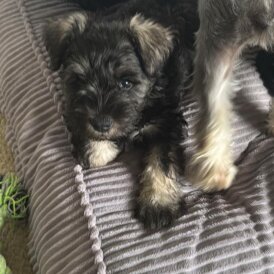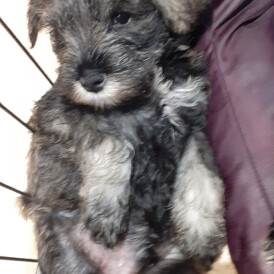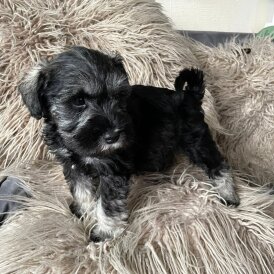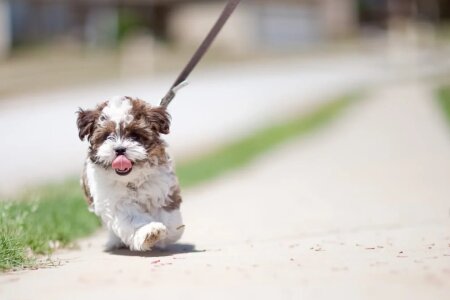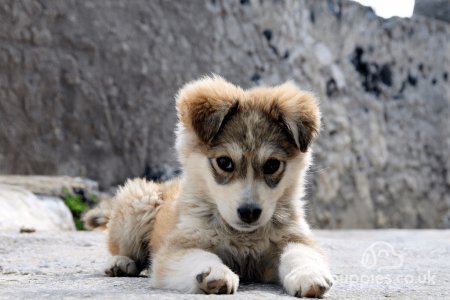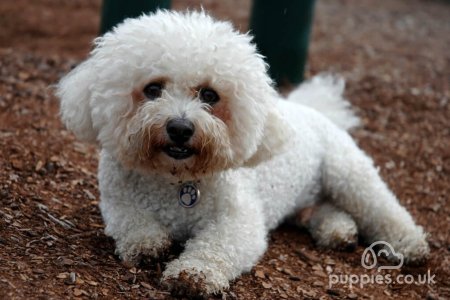Miniature Schnauzer Puppies and Buying Advice
Mix a little bit of goofy, independent, intelligent, and sometimes cheeky and what do you get? Miniature Schnauzers are a small, utility purebred type of Terrier that tend to be affectionate and adaptable, making them an ideal puppy choice for those willing to put in a little effort due to their stubbornness. Miniature Schnauzer puppies may be small, but they are no slouch in terms of popularity. In the UK, Miniature Schnauzers rank consistently in the top 20 breed registrations year after year. This spunky breed is the most popular Schnauzer breed as well thanks to its high spirit despite its diminished size when compared to other Schnauzers.
Why Miniature Schnauzers are Great
Some highlights of Miniature Schnauzers:
Intelligent: they are amongst the smartest dog breeds and tend to be easy to train.
Friendly: they get along well with cats, dogs, children, and the elderly.
Maintenance: these puppies shed very little (or not at all), don’t drool, or stink.
Affectionate: they bond well with owners and will form a warm and loving bond for years to come.
Watchdog: as a territorial breed, Miniature Schnauzers make excellent watchdogs that will diligently observe and alert owners.
Things to Consider when Looking at Miniature Schnauzers for Sale
Some downsides to the Miniature Schnauzer:
Grooming: they require lots of grooming.
Weight gain: they are more predisposed to putting on weight than other breeds.
Require attention: they don’t much like being left alone and are happiest when family members are at home with them.
Not ideal as a first puppy: they tend to be stubborn, thus they are perhaps not ideal for first-time puppy owners.
History of the Miniature Schnauzer
Originally a German breed (known as the Zwergschnauzer), the Miniature Schnauzer dates back to as early as 1888. Its predecessor, the Standard Schnauzer, was bred for centuries prior as a farm dog. These larger dogs were bred with other, smaller breeds such as the Miniature Poodle, Affenpinscher, Pomeranian, or Miniature Pinscher for the purpose of ratting and thus became the much smaller Miniature Schnauzer.
Appearance
As their name implies, Miniature Schnauzers are small dogs with a square-shaped body. They tend to have a medium-sized double coat of fur. The exterior is wiry while the undercoat is soft and cuddly, particularly as puppies. Four colours are commonly recognised for their fur. The Miniature Schnauzer has a rectangular-shaped head with a big, bushy beard, eyebrows and moustache. Their eyes are dark and their ears are fluffy and forward-pointing. They have short and thin tails, strong and straight front legs, and short, round feet.
How big is the Miniature Schnauzer?
Miniature Schnauzers are small dogs. Males grow on average to 35.6 cm in height, whilst females can grow up to 33.0 cm high.
How heavy is a Miniature Schnauzer?
Fully-grown adult male Miniature Schnauzers weigh between 5.0-8.2 kg on average, whilst females weigh between 4.5-6.8 kg.
What colour is the Miniature Schnauzer?
Internationally-recognised colours for Miniature Schnauzers include all black, silver and black, salt and white, and pepper.
Temperament
Miniature Schnauzer puppies are excitable, much like other breeds of puppies, but they’re also intelligent, alert, affectionate, and obedient. Their intelligence is second to none, making them an ideal breed of puppy for teaching tricks, commands, and good behaviour while they’re still young. They can reliably learn commands the first time, with few repetitions required. As puppies, they’re also sensitive and are thus affected emotionally quite easily. They require three things above all: schedule, schedule, and schedule. Routine behaviour and exercise will go a long way to fostering an affectionately loving and obedient Miniature Schnauzer. A lack of routine and attention can lead to destructive behaviour, such as chewing furniture and carpets and possibly more frequent barking and nipping.
Do Miniature Schnauzers make good guard dogs?
As one of the best watchdogs, Miniature Schnauzers excel at observing and protecting their territory and property. Thanks to their superb vocal cords and hearing, they’ll alert you whenever they feel uneasy or sense a visitor coming.
Do Miniature Schnauzers bark a lot?
On account of their excellent hearing and vocal cords, Miniature Schnauzers will frequently bark whenever they feel alarmed, afraid, bored, in need of attention, lonely, or to protect themselves or their owner. Their barking varies, with different barking pitches depending on how they’re feeling. If they need something, they’ll surely let you know.
Are Miniature Schnauzers easy to train?
Miniature Schnauzers possess high intelligence and are therefore easy to train. They are able to quickly associate commands with actions.
Are Miniature Schnauzers playful?
Much like many other dog breeds, Miniature Schnauzers are playful, especially as puppies. They do, however, tend to bark in excitement.
Are Miniature Schnauzers good with children?
Miniature Schnauzers get along well with children and rarely, if ever, nip or chew, although puppies may nip a little until properly trained. They’re loyal and protective dogs that aren’t aggressive.
Are Miniature Schnauzers good with other pets?
If you own any other cats or dogs, Miniature Schnauzers should get along just fine with them. As puppies, they will likely chase other animals around the house, but they won’t normally hurt them. Smaller pets such as rodents may be in danger since Miniature Schnauzers were originally bred as barn animals to catch rats.
Can I leave a Miniature Schnauzer alone?
If you’re looking for a puppy that’s fiercely independent, Miniature Schnauzers may disappoint. They require a lot of love and attention and as such are happier and more well-behaved when a family member is present.
Do Miniature Schnauzers like water?
Miniature Schnauzers enjoy being on boats, but they will require a lot of training and supervision if you plan to take them swimming with you.
Health
How long do Miniature Schnauzers live?
Generally, Miniature Schnauzers are expected to live anywhere from 10-15 years.
How much exercise does a Miniature Schnauzer need?
About an hour a day of exercise is recommended for Miniature Schnauzers. They’ve got plenty of energy and take short naps, so they’ll love going on walks and running in the park.
What are Miniature Schnauzers’ common health issues?
Due to their predisposition to put on weight easily, Miniature Schnauzers may encounter health problems due to high fat levels, such as hyperlipidemia, diabetes, and cataracts in their eyes. Epilepsy, urinary stones, von Willebrand disease, and comedone syndrome may also afflict your Miniature Schnauzer. Ear infections are also common, especially after swimming, so do ensure you have their ears checked regularly.
Care
How much space do I need for a Miniature Schnauzer?
Territorial and protective, Miniature Schnauzers prefer staying at home performing their natural watchdog duties. They do require a fair bit of exercise, however, so let them explore and wander occasionally but do keep an eye on them to ensure they don’t wander too far away.
What should I feed my Miniature Schnauzer?
Feed your Miniature Schnauzer ½ to 1 cup of dry food of high quality to prevent health problems common to this breed. Feed them the recommended amount twice a day and adjust for their weight and activity level. Be careful not to overfeed Miniature Schnauzer puppies, since they can easily pack on the weight and become obese.
How much grooming do Miniature Schnauzers need?
Although Miniature Schnauzers don’t shed much fur, they do require plenty of regular grooming. Brush daily to prevent shedding and to untangle their matte fur. Moreover, you’ll want to wash and clean their eyebrows, ears, and beard since they are prone to infection. Professional grooming is a must for anyone that doesn’t have the time or grooming expertise. Regular flea treatments, nail trimming, and bathing (including use of dog shampoos) are all essential to keeping your Miniature Schnauzer healthy. When you have him groomed, opt for a short cut.
Do Miniature Schnauzers shed?
One of the biggest advantages of owning a Miniature Schnauzer is that they shed very little to no fur, which makes cleaning furniture, carpets, and floors a breeze. It also makes them a sensible hypoallergenic dog breed if you’ve got family or friends that have dog allergies.
Average Costs
How much does it cost to keep a Miniature Schnauzer?
As a rough guide in pricing: Cost to buy: roughly £400-600 for a well-bred Miniature Schnauzer puppy Other costs (Vet, Food etc): £50-80 per month
Specific Buying Guide
You can read our general buying guide here, with the most important thing being going to view your Miniature Schnauzer puppy, seeing it with its mother, and checking the quality of the breeder. More specifically, here is some Miniature Schnauzer puppy buying advice:
If purchasing online, always purchase from reputable sellers that allow you to see the puppy in person before purchasing. Don’t fall for adverts that request money upfront; visit the seller in person and ensure that the puppy is as advertised.
Ensure that your Miniature Schnauzer is properly microchipped and has all relevant vaccinations. If the seller can’t provide paperwork proving that the puppy was bred according to the Kennel Club’s rules, look elsewhere.
Other Reading, Adopting Miniature Schnauzer Puppies and Rescue Organisations
A big thank you to the following sources who helped to shape this article: Kennel Club of Great Britain: https://www.thekennelclub.org.uk/services/public/breed/display.aspx?id=4096 Training Mini Schnauzer: https://trainingminischnauzer.com/training-your-miniature-schnauzer-puppy-to-swim https://www.pdsa.org.uk/taking-care-of-your-pet/looking-after-your-pet/puppies-dogs/small-dogs/miniature-schnauzer https://www.theminiatureschnauzerclub.co.uk/






